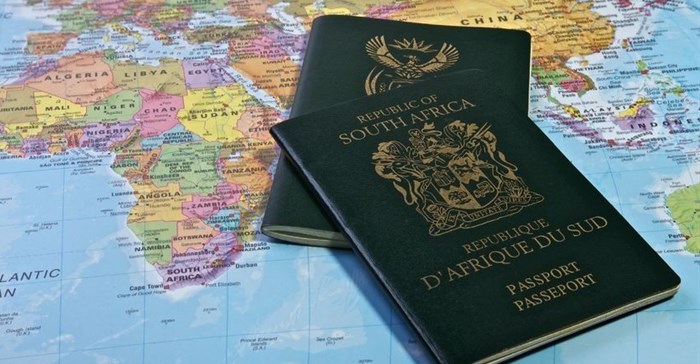A study by online booking site Travelstart.co.za between April and July this year has revealed that 49% of South African travellers say they consciously select overseas destinations with no visa requirements or those that issue a visa on arrival. More than 900 South Africans responded to the study.
The results of the study offer insight into the impact visas have on travellers. South African passport holders represented 91% of responses and 48% said they have applied for a visa in the past 12 months.
The financial and time cost of travel visas is increasingly onerous for South African passport holders. Tricky documentation requirements, distant visa application centres and drawn-out turnaround times only add to the headache of navigating a visa submission.
Despite the inherent inconvenience of visas, South Africans are willing globetrotters and fare well in terms of satisfying requirements with only 4% confessing they have been the subject of a visa refusal. According to the research, most refusals are issued by the United Kingdom, USA and the Schengen area respectively.
While processing authorities aren’t obligated to give reasons for vetoing a visa, primary motives for visa denial vary from failing to provide sufficient reasons for the purpose of a visit, inadequate proof of funds (to support stay in destination) to irregular travel histories, unfavourable visa histories and lack of a travel itinerary. Additional reasons for a rejection can include past and current criminal convictions, damaged passports and inadequate travel insurance, although none of the survey participants said they were denied for these reasons.
The cost of visa refusal
Several South African passport holders said visa application complications have led them to postpone travel (22%), lose money (17%), cancel an entire trip (10%) and miss flights (6%). The research offers further insight into barriers to entry for obtaining a visa. Negative sentiment is dominated by visa costs, excessive documentation requirements and vague application guidelines, which ranked ahead of lengthy application processes, lack of visa payment options and far distances to travel to the nearest visa office (which carries its own cost implications for people residing outside major cities).
Appointments and processing times
There is no straight answer in terms of the availability of visa appointments, and in most cases, the speed in which a decision is reached remains out of applicants’ hands. While some authorities take less than one week to process a visa, others can take more than six weeks. How quickly a visa is granted often hinges on whether the Embassy or Consulate is suffering from a backlog of applications. Some local travel agents report waiting up to six months to secure an appointment at the Consulate General of the United States.
While recent US Consulate processing times are unusual, appointment access is likely to improve. Travelstart’s research found that 31% receive a decision on their visa within two weeks of applying and 28% receive a decision in less than one week. UK and Schengen visa turnarounds are inconsistent, but applicants can expect an estimated turnaround time of between two and four weeks. Some countries and application centres offer an express service when the circumstances of travel are urgent, however, this option attracts higher processing fees and availability isn’t guaranteed.
Passport and visa tips
Generally, travellers should ensure their passport is valid beyond their return date (at least three months) and that it contains enough empty pages for new visas and immigration stamps before beginning a visa application. The onus is on the traveller to validate these small details, and oversights can result in a sour start to a long-anticipated overseas holiday. In addition, travellers should familiarise themselves with the visa regulations of the country they are applying to visit as there is no one-size-fits-all guideline.
Travelstart advises overseas travellers to keep in touch with changes in a country’s visa laws and to apply as soon as possible ahead of their departure date.
While international flights that include a stopover are frequently cheaper than flying direct, multiple stops can present challenges such as transit visa requirements. Even if a passenger’s end point is visa free, the rules governing stops in between must be checked to avoid delays and disappointment.
Emergency passports are risky travel documents and many countries do not accept them. The Department of Home Affairs recommends travellers check with the relevant authorities of the country they are visiting before applying for an emergency passport/travel document.
An individual’s online and social media presence is a decisive factor when it comes to job applications and the same applies to visas. The US State Department now requires visa applicants to submit their social media usernames, previous email addresses and phone numbers. Maintain a clean online presence and don’t let ancient tweets or an ill-considered Facebook post count against you when decision-makers scrutinise your application.
Visas remain a necessary evil and the knowledge that most travellers’ globetrotting ambitions are at the discretion of an anonymous authority, does nothing to ease pre-departure anxiety. On the plus side, most South Africans complete visa applications without a hitch, however, those who refuse to submit to the fuss should not be put off from seeing the world. South African passport holders can visit 101 countries visa-free (68 visa-free entry, 33 visa on arrival).
Among the destinations are Botswana, Brazil, Ethiopia, Hong Kong, Israel, Kenya, Mauritius, Qatar, Singapore, Zambia, Zimbabwe - all these countries offer exceptional tourism opportunities and, depending on the airline you choose, are accessible on non-stop flights departing from at least one of South Africa’s three major airports.




































